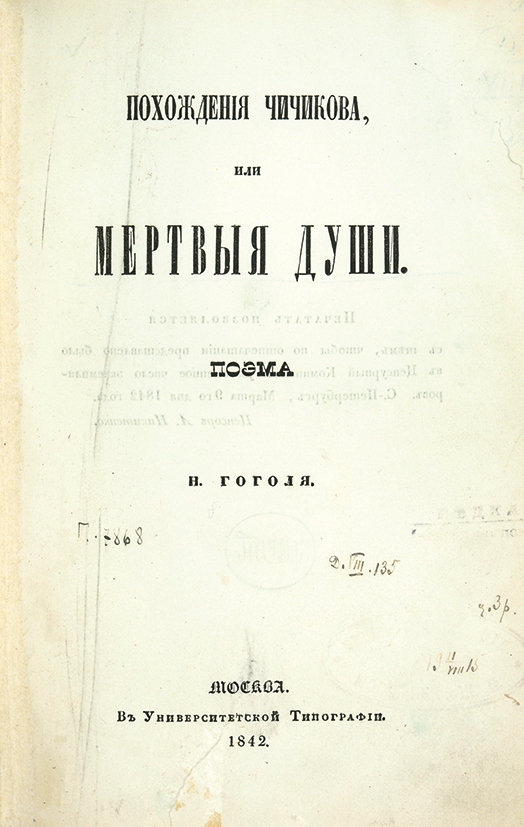Dead Souls (partially found second volume of Russian poem; 1842)
Dead Souls is a Russian epic poem written by Nikolai Gogol. Considered to be an exemplar of 19th-century Russian literature. Dead Souls follows Pavel Ivanovich Chichikov as he travels to various estates of landowners around the Russian Empire as he seeks to buy serfs (souls) who only existed on paper from landowners in order to reduce the amount of taxes they would have to pay. While Nikolai Gogol attempted to emulate classics such as Odyssey and the Divine Comedy the poem came off more like a picaresque novel instead. Nevertheless, Dead Souls would draw massive praise having been included in the World Bookclub. While a second volume was in the works and with plans to make the third volume, at the advice of his priest, Nikolai Gogol burnt the second volume of Dead Souls before his death. While some parts of the second volume does survive mostly in draft form, most parts of the second volume have not been found.
Background
Attempts to bring the Russian Empire up to the standards of the West dates back to the 17th century under the reforms of Czar Peter the Great. Under these reforms, relations with the West increased, and a new capital was built. Despite this, Russia was still seen as largely backward by the European powers. Despite this, the 19th century saw an increase in literacy across all classes of the Russian Empire. With an increase in literacy, there was an increase in the translation of various classical and contemporary works of literature. With an influx of translations of classical works into modern Russian, many Russian authors such as Leo Tolstoy and Nikolai Gogol wrote about themes such as politics, philosophy, realism, satire, and adventure, among other themes.[1]
Plot
Dead Souls follows Pavel Ivanovich Chichikov as he travels around various estates in the Russian Empire. in fictionalist Russia as portrayed by novel, estate owners must pay taxes on dead surfs (souls) until a new census is released. Pavel Chichikov goes around buying these dead surfs from the estateowners and morgaging them in order to start his own estate. Throughout the episodic poem, Pavel charms his way into estates of prominant people of Russian society by offering to paint their prottrait in exchange for the dead surfs. Eventually, people catch onto Pavel's true intentions and he is arrested. While on trial, his lawyer reveals the various scandals in the province and promonant people which in turn causes all charges against him to be dropped. After he is released from prison he continues going around Russia scamming various estates.[2]
The poem ends midsentance as Nikolay Gogol had intended to make his poem into three parts.
Availability
While all of the second volume for Dead Souls was intentionally destoryed in a fire, four chapters of the second volume exist in the forms of draft. It is unknown if these drafts were the final plots for the second volume. As of now, only portions of the second volume for Dead Souls exist in the forms of drafts.
Legacy
Despite the abrupt ending of the poem, Dead Souls has garaned a great legacy. Since 1909, Dead Souls has been adapted into nine films as well as a multipart television series in Russia. In 1933, writer Mikhail Bulgakov adapted Dead Souls into a play for the Moscow Art Theatre. This in turn, has had Dead Souls adapted into a play over twenty times. Lastly, a three act opera based off of Dead Souls was written in 1976 playwrite Rodion Shchedrin.[3]
References
- ↑ New York Times articles on the literature of Russia during the 19th century. Retrieved 21 May '21
- ↑ The plot for Dead Souls. Retrieved 21 May '21
- ↑ Article on the Dead Souls opera. Retrieved 21 May '21
